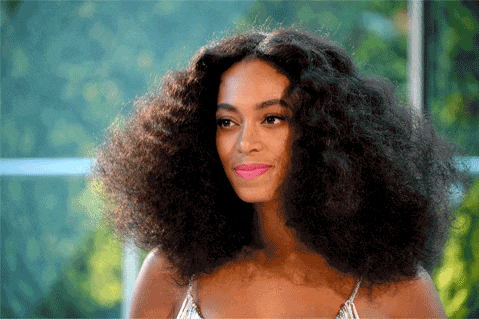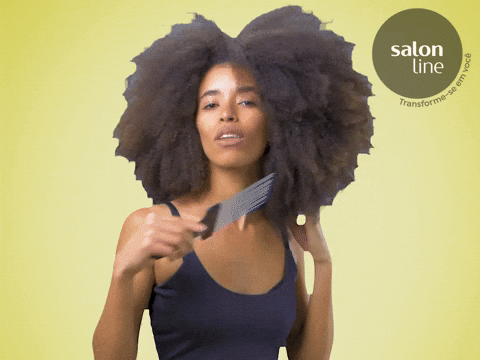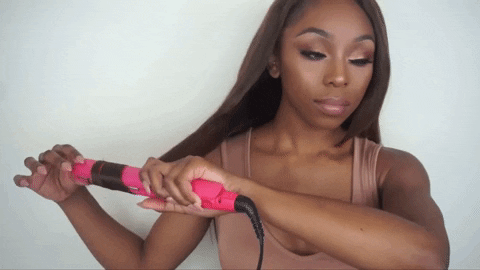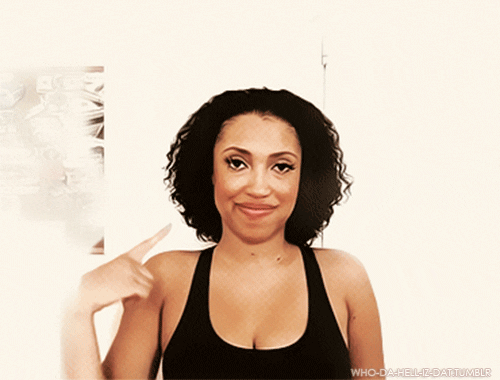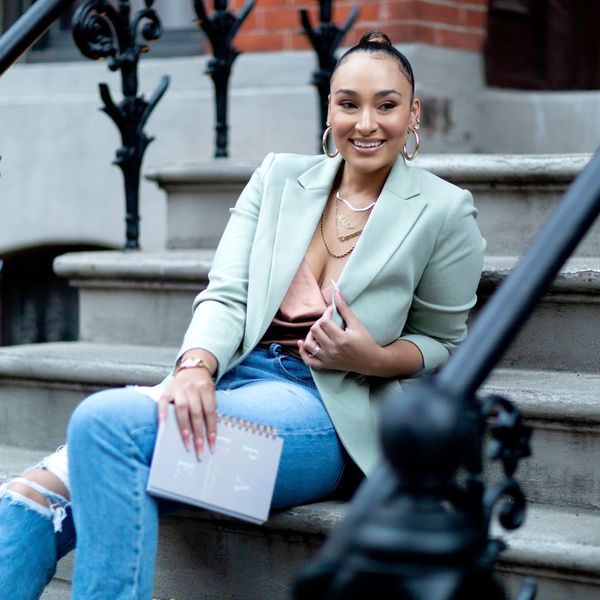
It's a wrap, y'all. Can you believe 2020 is almost over? We have officially entered my favorite season of the year which, for many of us, between carving out more time to spend with our loved ones for the holidays, closing the company's books for business owners, and doing all sorts of things to get ready for the year ahead, can be a hectic time. It's also a time during which there's massive self-reflection going on—contemplating the months that have just passed, positive and negative events that have occurred, what has gone well and what hasn't, as well as determining the actions that we can take with the intent to make our futures better.
It's no secret that this year has been a bit...'unplanned' for lack of a better word. Unplanned in a sense where I'm sure none of us wrote down "surviving a pandemic and aggravated racism" on our goals list for 2020. But also in a sense where, despite the terrible things we had to go through and the many challenges we had to face, somehow I've seen the world express a lot of gratitude all along—if I dare to say, more than usual.
How and why is that? Well, this is a conversation I've been lucky enough to have with 4 incredibly resilient women that walked me through some of the hardest battles they fought this year, told me about what these difficult times taught them about gratitude, as well as what gratitude means to them.
Niekiha (Nikki) Duncan, 30
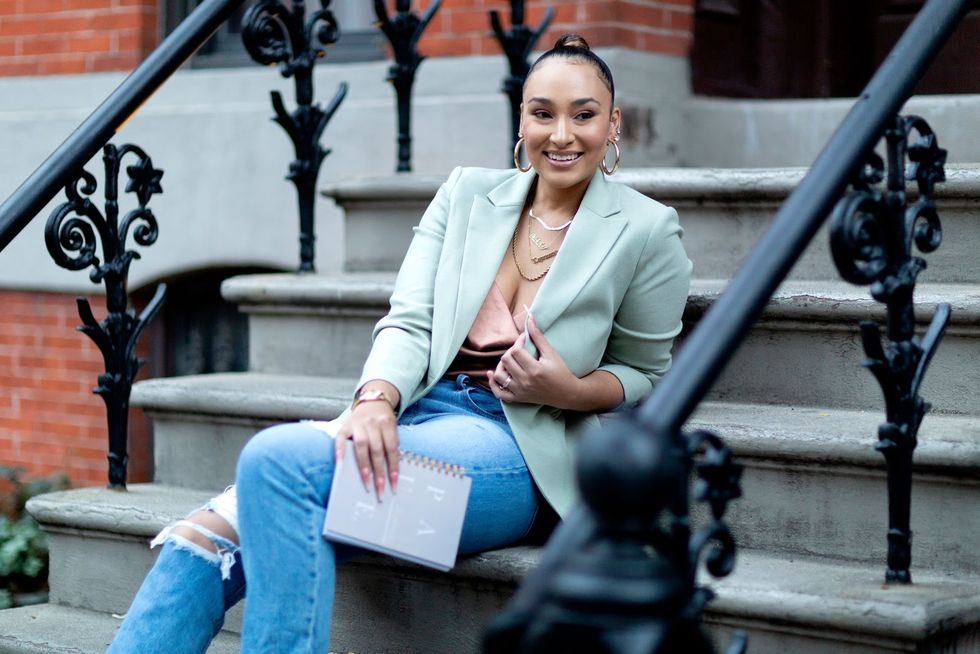
Courtesy of Niekiha Duncan
Graphic Designer, Creative Director, Blogger & Tattoo Shop Owner
When January 2020 rolled around, I found myself in an uncomfortable place. While vision board parties and "New Year, new me" talk surrounded me, I felt uninspired to plan anything. Buying a planner wasn't in my intentions, neither was setting any professional or personal goals. I felt lost about what I was doing and where I was going.
The main obstacles I faced this year all revolved around my own need for personal and emotional growth.
I, like many other women, have a tendency to try to control anything and everything around me. But times like these forced me to face the fact that no matter how hard we work on avoiding bad things from happening, in the end, rare are the times when we truly have the final say.
Confronting my own issues wasn't easy. I think it's fair to say that human beings have a hard time to admit that maybe the root of the problems they are facing in their lives actually lies within them. The process of holding myself accountable, dropping the excuses, and prioritizing my own journey was my biggest obstacle—but also my biggest reward.
I think that, as women, we tend to rush the "feeling like ish process" during hard times. Personally, there were times when I've navigated tough storms and found myself in a hurry to feel better.
Meanwhile, rushing into positivity often silences our ability to heal and suppresses a lot of necessary healing. Growth happens during hard times. Reflection is possible in moments where everything else is stripped away.
It wasn't until mid-March that I became more intentional about setting some personal and professional goals for myself. I remembered my wish to dive deeper into doing creative direction and graphic design for female-centric brands, and I acted on it. From there, the vision I had for my future became clearer, leading me to achieve major life goals that were previously nonexistent, such as creating and launching a physical planner plus a lifestyle brand focused on celebrating multilayered women in pursuit of self-improvement, self-love, and purpose. Today, unlike last year, I'm happy to say that I'm looking forward to 2021.
Finally, if I had to define gratitude, I would say it requires mindfulness; allowing yourself to pause from time to time and reflect on the journey. It's finding a balance between appreciating your growth, owning your past, and desiring to have more.
Follow Nikki on Instagram: @dailybynikki.
Akima Byfield, 28
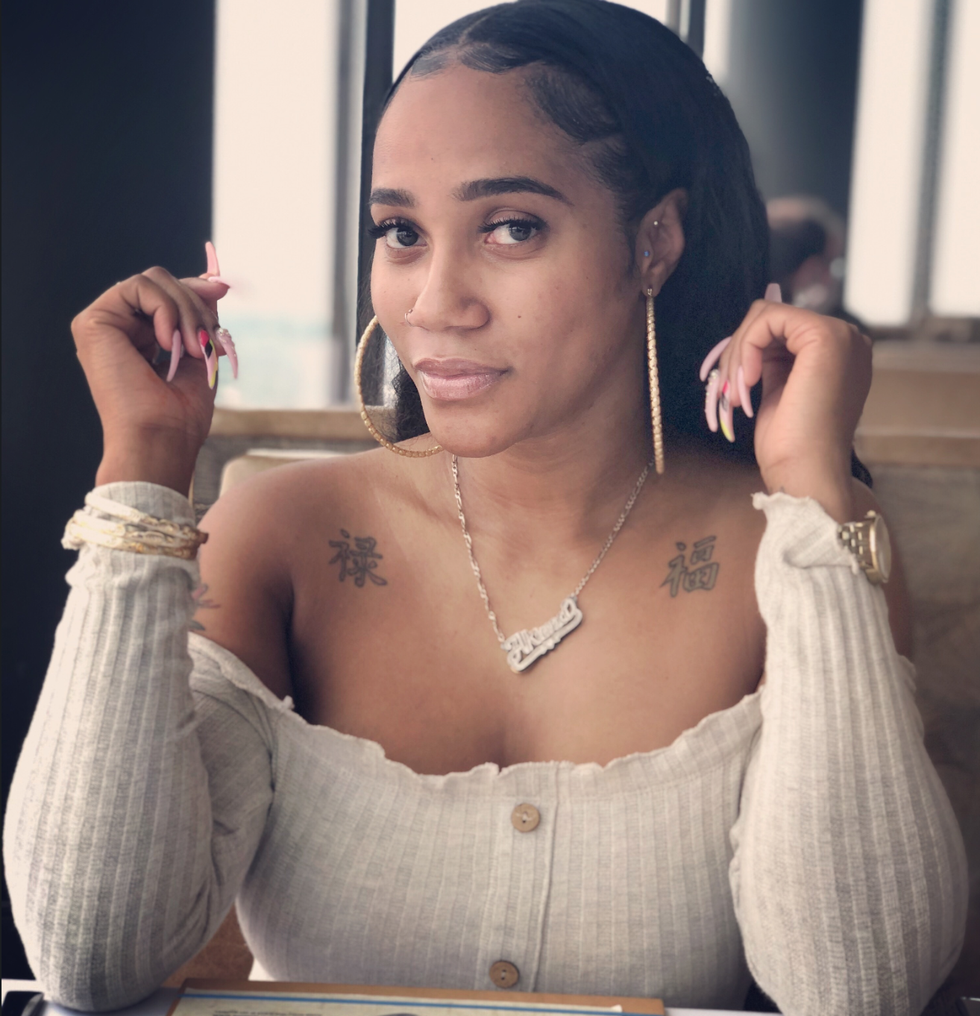
Courtesy of Akima Byfield
Healthcare Operations Manager
This year challenged my mentality on a level I didn't see coming and was not prepared for at all. It took a toll on me as there were many crying and unhappy nights. All that I longed for financially happened and it turned out I was more unhappy than I was when I didn't have it.
At the end of each year, I purchase a new journal to dedicate my thoughts and goals for the upcoming year. On December 31, I spend an hour and a half before the new year to jot down any and all things I would like to see come into fruition. In 2019, I envisioned many things scaling from mental, emotional, physical, and materialistic means. I also prayed for a new position which I was able to accomplish with the help of the Most High.
I manifested a salary increase of $34,000 which placed me as the first African-American and youngest Operations Manager in the company's history.
I've learned that although it may be easier to bask in the negativity, we should put work into finding the positive just so we can be reminded that every "L" isn't a loss. Quite the contrary, most of the time, it's a lesson. That what is meant for us will be ours, at the time that is destined for us. To be happy with ourselves and our situation, we must appreciate ourselves and all that we've previously overcome.
Follow Akima on Instagram: @_akima
Robin Allison Davis, 36
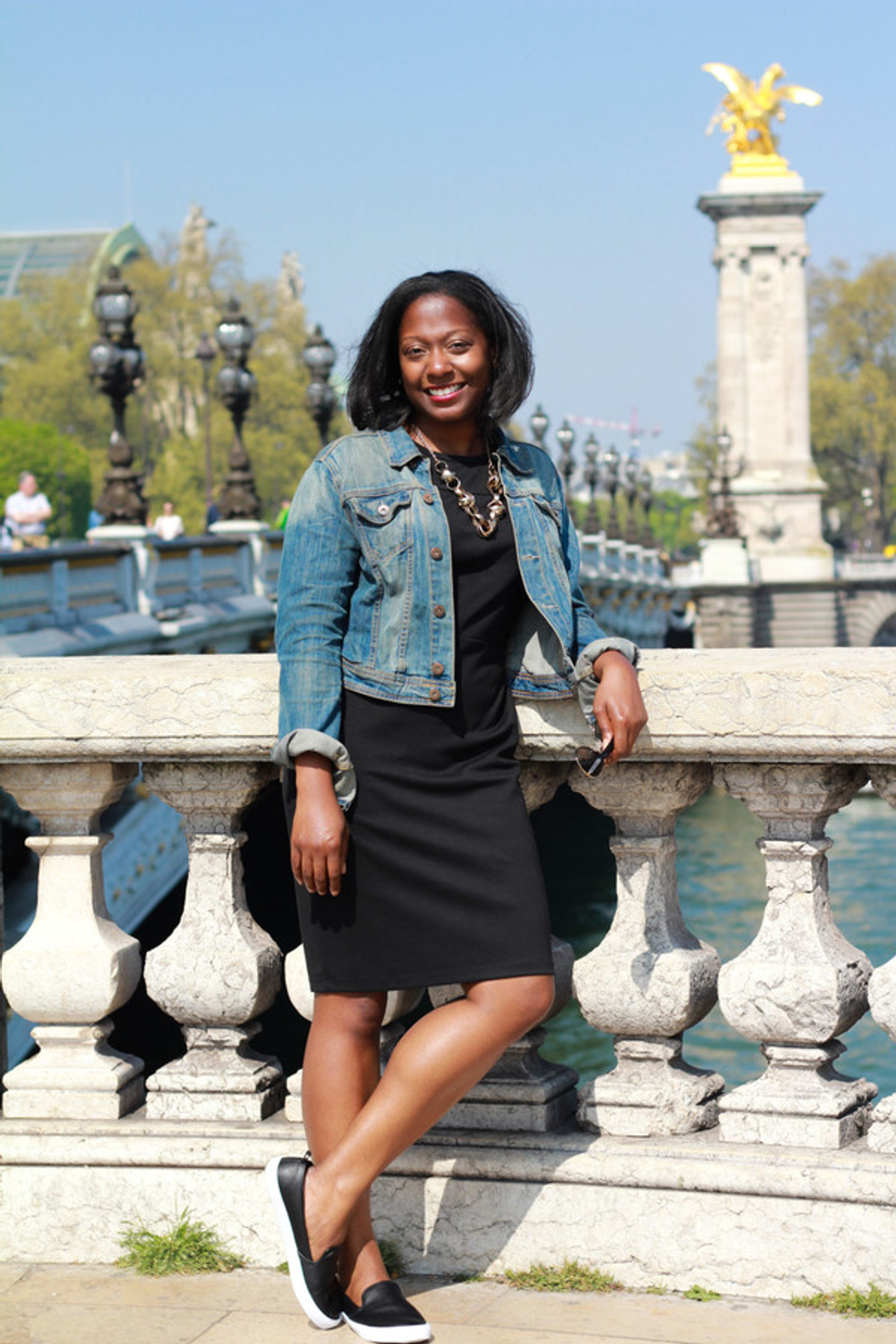
Courtesy of Robin Allison Davis
Producer (Documentary/Multimedia)
What has this year taught me about gratitude, you ask? Well, I've learned that if we take the time to look around, we can see that no matter where we find ourselves in life, beauty still surrounds us and small wins do matter.
I began my year undergoing my last reconstructive surgery after a 1.5 year battle with breast cancer. I didn't have too many goals for 2020, to be honest; my main plan was to get back on my feet after a trying and difficult two years. However, life threw me a curveball during the summer. To be honest, I believed nothing could be as bad as what I already went through.
It's hard to explain the roller coaster that 2020 has been. I'd had a very tough two years going through my cancer journey virtually alone considering I'm a single American expat living in Paris, France.
Shortly after my reconstructive surgery, France went into its first round of lockdown due to COVID-19. Knowing that I was vulnerable because of my medical history, I strictly adhered to the rules and never left my small studio apartment for the entire eight weeks during which we were required to stay home. It was a joy to be healthy and have my own space to keep myself safe. But when I visited my doctors for my follow-up appointments after they lifted the lockdown, after multiple tests and yet another surgery, I was told that my cancer returned—more aggressively. I'm currently going through chemotherapy as I'm writing this—not quite the end of the year I had imagined.
It's shocking to find out that you'll be battling cancer twice in two years. It's even worse when the reality hits you that due to the pandemic, you have to go through your treatment alone, without family or friends able to fly over to help you recover.
Mentally and emotionally, I felt broken. Yes, I'd done this before but never had I had to go through it in a time where I'm not allowed to reach out to a friend for a hug. Breast cancer can be an extremely isolating experience and the COVID-19 made it even worse.
I don't think I'm well-placed to give advice on how to maintain a state of gratitude. I'm still on my journey and it's even more difficult than I expected it would be. But maintaining a positive attitude is one of the most important things I can do to win my battle and aid in my recovery. One thing that I try to remember is to be kind to myself. If I'm not where I need to be mentally, I may be the next day or the day after.
With all of that being said, even with everything that has happened this year in the world and to me personally, I'm not willing to say that 2020 is the worst year ever.
It's not an answer you would expect from someone going through cancer treatment, but what I'm most grateful for are my health and my body. I've gone through multiple surgeries, rounds of chemotherapy and so much more, but I'm still here. My body is still fighting and in most moments, I feel completely fine—although exhausted. I made the conscious effort to not hate my body for my situation, but to encourage it to continue the fight.
Follow Robin on Instagram: @robinista
Chantel King, 29
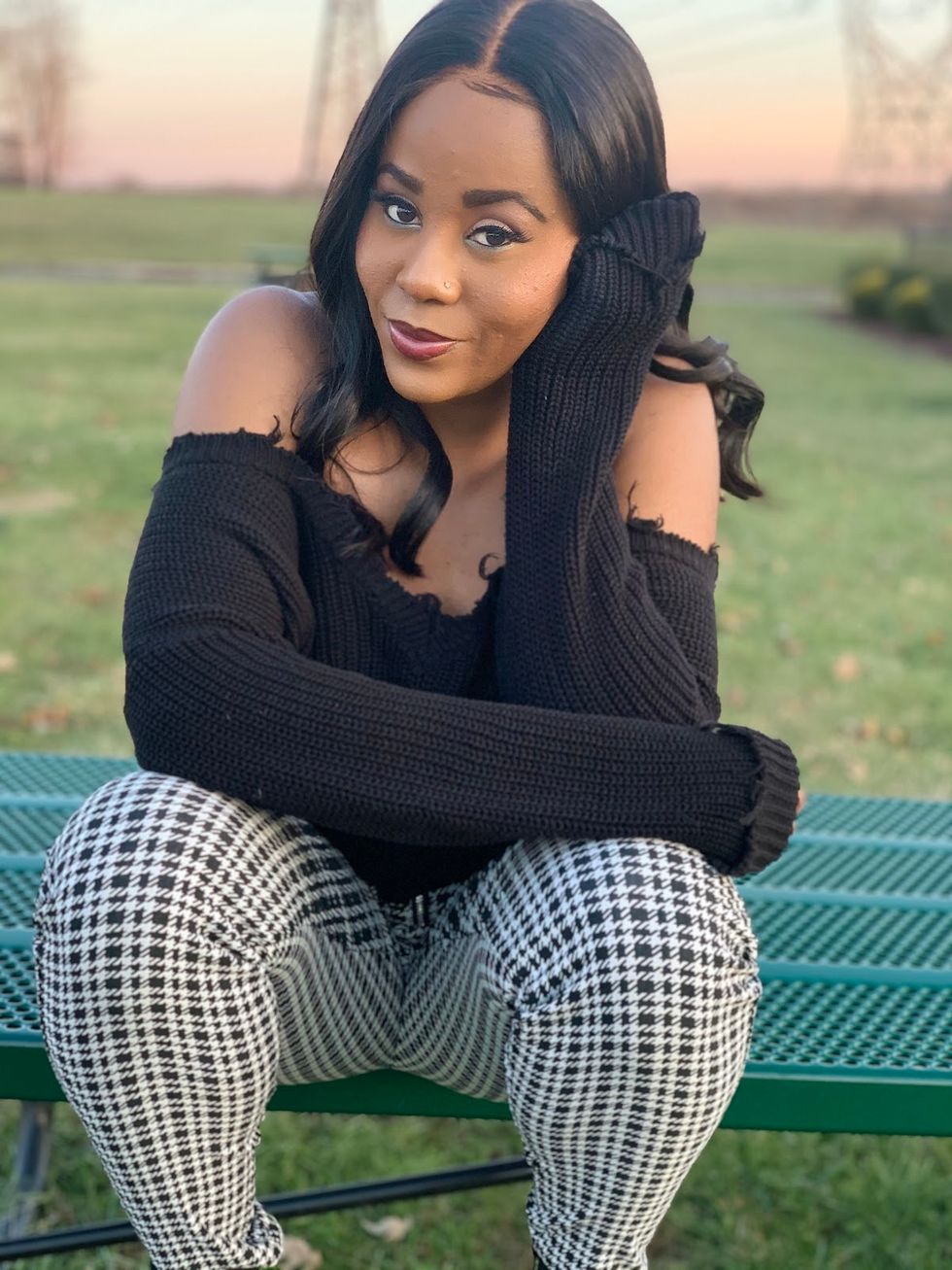
Courtesy of Chantel King
Content Creator
From the beginning, 2020 was getting the best of me and weighing me down, both on a mental and emotional level. It felt as though everything that I worked for was being taken away from me one by one.
First, it was my 10-year relationship. Although the breakup occurred a few months before we entered this new decade, I was still trying to find my way back to myself and heal my heart when the year started. Then, during the summer, there was that one week that completely K.O.'d me and turned my life upside down: My best friend and I parted ways because of a meaningless argument, my other best friend, my 15-year-old dog Tigger, passed away the next day, and the day after, I got laid off from my 9-5 which left me with a brand new car note to pay off with zero income. Oh, and did I mention that not even a month after getting my brand new car, I got into a car accident that could've easily taken my life?
Until recently, that's what 2020 consisted of for me: Falling into depression, not having much to brag about whereas I pictured myself engaged, moved out with a new car, and working my dream career by this time. But I had nothing. And yet, I was still being grateful.
Gratitude plays a huge role in my life. It's what keeps me motivated. Not long ago, I started a concept called 365 days of gratitude. Every day, I make a list of the things I'm grateful for to help me get through my darkest days. Doing this taught me to find the simplest blessings in my daily life. Some days are tough, some others are sad, but if we find something to be thankful for, then the way we view our reality changes. It also taught me that, more than anything, life happens for a reason.
We cannot stress over what we cannot control; instead, we should find a way to fix things. Stressing does nothing but make us miserable. One of my favorite quotes is: "Do not dig up in doubt what you planted in faith." In other words, just because things are bad now doesn't mean they will stay that way.
The proof is, when I got laid off, I took advantage of my free time to hone my creative skills which include writing, all while networking during virtual events. That later led me to land a Social Media Manager gig with a renowned brand. Never in my wildest dreams did I think I would be in the position I am in today.
By pushing through. By changing your perspective, learning to accept, and letting go of things you cannot control. That's how you create and maintain a state of gratitude. Instead of saying, "Damn, I wish I could stay in bed," when your alarm goes off in the morning, say, "I'm so thankful to see another day."
Find the little blessings in life; they are there to remind you that you are doing just fine.
Follow Chantel on Instagram: @chantel.ciera
Featured image courtesy of Niekiha Duncan
- 20 Statements Boldly Declare In 2020 - xoNecole: Women's Interest ... ›
- LeToya Luckett On The Prayer Of Graditude That Led Her To Her ... ›
- Michelle Obama's Message Of Gratitude - xoNecole: Women's ... ›
- Cultivating An Attitude Of Gratitude Needs To Be Your Forever Mood ... ›
This Is How To Keep 'Holiday Season Stress' From Infecting Your Relationship
Hmph. Maybe it’s just me, but it seems like there is something really weird happening in the fall season air (because winter doesn’t officially begin until December 21) that cuddle season is in full swing while break-up season is as well. In fact, did you know that break-ups are so popular during the holiday season that December 11 is deemed Break-Up Day?
The reasons why relationships shift around this time vary; however, I did both roll my eyes and chuckle when I read that a very popular one is because it’s an easy way to get out of getting one’s significant other a Christmas present. SMDH.
Anyway, I personally think that the less shallow folks out here may contemplate calling things “quits” or they at least distance themselves a bit from their partner (and what I’m referring to is serious relationships) due to all of the stress and strain that oftentimes comes with the holidays whether it be financial, familial, due to their tight schedules or something else.
Listen, I would hate for you and your man to miss the fun and happiness of experiencing this time of year, all because you are so overwhelmed or irritated that you can’t really enjoy it. That’s why I have a few practical tips for how to avoid allowing the typical holiday season stress from INFECTING your relationship.
Manage Your Expectations
 Giphy
GiphyUnmanaged expectations. If there is a main reason why the holiday season tends to be so stress-filled for so many people, I’d bet good money that this is the cause. And when you’re in a long-term relationship, expectations can manifest themselves in all sorts of cryptic and/or unexpected ways. You might have relatives who assume that you are going to be with them for Thanksgiving or Christmas when you have other plans in mind. You might be thinking that you are going to spend one amount for presents while your man is thinking something totally different. When it comes to scheduling, your signals may be crossed.
And you know what? To all of these scenarios, this is where clear and consistent communication come in. Don’t assume anything. Don’t dictate anything either. From now until New Year’s, mutually decide to check in once a week, just to make sure that you are both on the same page as it relates to the holidays and what you both are thinking will come along with it. The less blindsided you both feel, the less stressed out you will be. Trust me on this.
Set (and Keep) a Budget
 Giphy
GiphyOkay, so I read that last year, 36 percent of Americans incurred some type of holiday-related debt. Hmph. Last year, there was still some sense of normalcy in this country, chile, so I can only imagine what finances are gonna look like over the next several weeks. That said, since I don’t know a lot of people who don’t find being broke stressful, make sure that you and your bae set a budget and then stick to it this year — no ifs, ands or buts.
Because really, y’all — it doesn’t make sense to deplete savings and/or max out credit cards for a few days of giggles only to be damn near losing your mind because you don’t know how to make ends meet come Dr. Martin Luther King, Jr. Day.
And by the way, this tip doesn’t just speak to things like food and gifts; I also mean travel. If it doesn’t make a ton of sense (or cents) to be all over the place this year — DON’T BE.
Keep Matthew 5:37 at the Forefront
 Giphy
GiphyIf off the top of your head, you don’t know what Matthew 5:37 says, no worries, here ya go: “But let your ‘Yes’ be ‘Yes,’ and your ‘No,’ ‘No.’ For whatever is more than these is from the evil one.” That verse right there? Oh, it’s a boundaries lifesaver! I say that because do you see “maybe” or “I’ll think about it” in there? Nope. LOL. It says that you should tell people “yes” or “no” and leave it at that — and that complements Anne Lamott’s quote, “’No’ is a complete sentence” impeccably well. Yeah, you’ve got to remember that anything beyond a yes or no to a request is privileged information; you don’t owe anyone details or an explanation.
Besides, if you are really honest with yourself, when someone asks you something and you give a “Umm, let me think about it” kind of reply, more times than not, you already know what your answer is going to be — so why not let you both off of the hook? Give your response. Commit to that. And let everyone (including yourself) get on with their lives and schedules.
I promise you that when it comes to those holiday parties, you are pissing more folks off by not RSVP’ing or doing so and not showing up than just saying, “Thank you but not this year” off the rip.
Remember That Your Personal Space Is Privilege Not a Right
 Giphy
GiphyA friend of mine recently bought a new house and invited me over to come see it. He’s a single man with no children, so as I was taking in all of the space that he had, especially as I walked through his finished basement, I joked about relatives coming to live with him. “Hell no” and “absolutely not” were pretty much his immediate responses as he went on to say that some folks even had the nerve to be offended when he told them that he had no intentions on taking DNA in.
Ain’t it wild how people think that your stuff is their right? And yes, that brings me to my next point. Your home is your sanctuary space. If you want to host folks this year — cool. If not, ALSO COOL. Please don’t let folks (family included) guilt you into how they want you to act or even into what they would do if the shoe was on the other foot. You are not them — and as one of my favorite quotes states, “If two people were exactly alike, one of them would be unnecessary.” (A man by the name Larry Dixon said that.)
Hell, my friends? They know that I am good for sending them random things that they need or even want all throughout the year. Coming over to hang out at my pace, though. Uh-uh. Chalk it up to being a card-carrying member of the ambivert club yet I like keeping my living space personal — and I sleep like a baby, each and every night, for feeling that way.
Always remember that your space, your time, your resources, your energy and shoot, yourself period (including your relationship), are all things that are your own. You get to choose how, when and why you want to share them. The holiday season is certainly no exception.
Cultivate Some “You Two Only” Traditions
 Giphy
GiphyIt’s not uncommon for some couples to hit me up after the holiday season to “detox.” Sometimes it’s due to the financial drama (and sometimes trauma) that they experienced. Sometimes it’s because they allowed their relatives (especially in-laws) to get more into their personal business than they should’ve. More than anything, though, it tends to be because they didn’t get enough quality time together and so ended up feeling “disconnected.”
Please don’t let that happen. Listen, I’m not even a holidays kind of woman and yet, I will absolutely sit myself down with some hot chocolate and chocolate chip cookies to enjoy a Hallmark holiday film or two. Aside from the fact that most of them are lighthearted and sweet, I also like that they usually focus on couples loving on each other amidst all of the holiday beauty and ambiance — which is something that all couples should set aside some time to do.
Maybe it’s a vacation. Maybe it’s a staycation. Or maybe it’s my personal favorite, A SEXCATION. Whether it’s for a few days, the weekend or even overnight — don’t you let the holidays go by without setting aside time for you and your man to celebrate one another. Don’t you dare (check out “Are You Ready To Have Some Very Merry 'Christmas Sex'?”).
GET. SOME. REST.
 Giphy
GiphyI once read that 8 out of 10 people get stressed out over the holidays and 3 out of 10 lose sleep during to it — and when you’re stress-filled and sleep-deprived, that can absolutely lead to hypersensitivity, making mountains out of molehills and even not being in the mood for sex.
Your relationship can’t afford to go through any of this, so definitely make sure to prioritize rest. I don’t care how unrealistic it might seem during this time, sleep should never be seen as a luxury; it will always and forever be a great necessity.
That said, try to get no less than six hours of shut-eye in (check out “6 Fascinating Ways Sex And Sleep Definitely Go Hand In Hand”) and even ask your bae to take a nap with you sometimes (check out “Wanna Have Some Next-Level Sex? Take A Nap, Sis.”). Not only will sleep help to restore your mind, body and spirit but, when it’s with your partner, it’s an act of intimacy that can make you both feel super connected, even in the midst of what might feel like chaos.
___
Holiday season stress is real. Still, never give it the permission or power to throw your relationship off. Put you and your man first and let the holidays be what they are gonna be, chile.
Let’s make things inbox official! Sign up for the xoNecole newsletter for love, wellness, career, and exclusive content delivered straight to your inbox.
Featured image by Shutterstock
It’s probably been over the past 2-3 years that I’ve become hyper-focused when it comes to applying certain chemical exfoliants known as acids to my skin. Personally, I’ve come to really appreciate ones like mandelic acid and hyaluronic acid because they have a way of softening my skin, brightening it up and really evening out my complexion overall.
In fact, on my skin, they have been so effective that they have caused me to wonder what would happen if I applied some of them to my hair too — and boy, was it an experiment that paid off big time!
If, while on your continual journey to get the best out of your own tresses, you’d like to learn how to get them healthier than it’s ever been, I’ve got seven acids that are typically known for skin use that can be just as beneficial to your hair as well.
1. Salicylic Acid
When it comes to your skin, salicylic acid is beta-hydroxy acid that is great for your skin if you’re looking for something that will exfoliate it, clear out your pores and dissolve dead skin cells. In fact, this is why it’s an acid that is quite popular when it comes to treating acne.
Your hair will enjoy salicylic acid because, if you’re looking to remove product build-up, you want to soothe an itchy or irritated scalp or you’ve got some dandruff flakes that are totally driving you up the wall, salicylic acid has the ability to treat all of this. Either purchasing a shampoo that contains this ingredient or adding it to your favorite scalp scrub is probably the most effective way to get the most out of it.
Just make sure that if your scalp is sensitive or dry that you approach with caution. In these instances, it could end up irritating your scalp more than helping it out, so use a very little bit in the beginning to make sure that it vibes with you.
2. Lactic Acid
Lactic acid is an alpha hydroxy acid that can help to even out your skin tone as well as slow down the signs of aging. The properties in it help to do this by reducing hyperpigmentation and boosting collagen production in your skin as well as keeping it hydrated.
Why is it great for your locks? For one thing, lactic acid is considered to be a humectant. This means that it pulls water from the air so that your hair is able to remain moisturized.
Another thing that makes it a winner is the fact that lactic acid breaks down dead skin cells on your scalp (so that your hair follicles are able to flourish), it can help to soften and detangle your hair (making it a helpful addition on your wash days) and it also helps to protect your tresses from heat styling tools and UV damage. Applying a hair rinse that’s made up of part lactic acid and part water can work wonderfully (so long as you apply it once a month, tops; more than that might be too “intense” for your hair strands).
3. Glycolic Acid
Glycolic acid is a water-soluble alpha hydroxy acid that is actually made from sugar. Your skin will adore it because it smooths the appearance of fine lines and wrinkles, improves the texture of your skin, gently exfoliates, clears your pores and brightens up your complexion overall.
The reasons why you should consider this acid for your hair is because it helps to keep your scalp youthful (and yes, there is such a thing; check out “Your Scalp Ages Six Times Faster Than Your Face. Why It Matters.”), removes excess sebum (that could be clogging up your hair follicles) and it helps to keep your hair moisturized. Your best bet here is to make it a part of your pre-shampooing ritual.
4. Succinic Acid
Succinic acid is an acid that is made from sugar cane and contains antimicrobial and anti-inflammatory properties. Although it doesn’t exactly exfoliate (like many of these other acids do), it can still be beneficial to your skin when it comes to reducing the kind of irritation that is associated with eczema, decreasing the bacteria that leads to breakouts and keeping your skin pretty hydrated.
As far as your hair goes, this is an acid that is worth trying out because it helps to balance the sebum that is on your scalp, remove dead skin and product build-up that can irritate your scalp and clog your hair follicles and, succinic acid is also beneficial when it comes to reducing dandruff and helping to prevent hair loss. Most people tend to apply this as a serum.
5. Hyaluronic Acid
I’ve officially sung the praises of hyaluronic acid on this platform before. One example is via the article, “Why Your Skin, Hair, And Nails Need Hyaluronic Acid Like...Yesterday.” On the skin tip, hyaluronic acid is great because it deeply hydrates your skin, contains anti-aging properties and can even bring relief to vaginal (including vulvar) dryness.
Your hair will adore this particular acid because it aids moisture to it (including your hair follicles), will help to improve your hair’s texture and it also soothes scalp dryness, nurtures the cuticles of your tresses and decreases frizz. Using a serum rich in this acid as a pre-poo or as a leave-in conditioner is recommended.
6. Azelaic Acid
If you’ve never heard of azelaic acid before, this is your lucky day. It’s a dicarboxylic acid that, when it comes to skincare (and hair care) products, is usually synthetic. Anyway, if you are looking for a way to reduce inflammation, even skin tone after a breakout or if you want to use an exfoliant that will improve the texture of your skin overtime, you might want to give this acid a shot.
This one makes the list as far as your hair is concerned because, if achieving more inches is your current focus, azelaic acid might come in handy. That’s because it is able to strengthen your hair, thicken your strands and also stimulate hair growth from within your hair follicles.
7. Glutamic Acid
Glutamic acid is actually a type of amino acid. Skin-wise, it’s great for deeply hydrating your skin as well as protecting it from pollutants and damaging UV rays. Also, if you’re looking for an acid that treats skin dryness or “tightness,” this could be the answer to your prayers.
Since glutamic acid is also considered to be a humectant, it’s another acid that can moisturize your hair. As a result, it can decrease breakage while helping your hair to feel smooth and look shiny.
BONUS: Amino Acids
Speaking of amino acids and hair, please try to keep some amino acids in your diet at all times. The reason why is because, since your hair is made up of mostly protein (keratin, to be exact), amino acids are pretty darn effective when it comes to helping you to maintain the overall health and well-being of your hair.
Ones to prioritize include proline (it boosts collagen so that your hair strands can maintain flexibility); arginine (it increases blood flow to your hair follicles so that they can receive the nutrients that they need); cysteine (it helps to keep your hair follicles healthy); alanine (it helps your system to produce more collagen), and isoleucine (it strengthens the tissues that help to make up your hair strands). All of these are available in supplement form or you can use Google to see which foods contain them.
___
Although it might initially seem odd to apply acid to your hair, as you can see, certain ones will work miracles for it. So, test them out to see which one tickles your fancy.
Hell, since they work for your skin as well — it’s a two-for-one deal that is worth every penny!
Let’s make things inbox official! Sign up for the xoNecole newsletter for love, wellness, career, and exclusive content delivered straight to your inbox.
Featured image by Shutterstock










